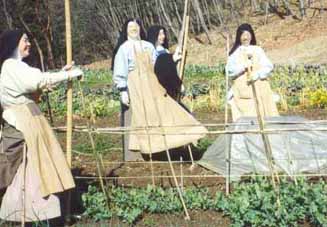Poverty and Conclusion

|
1) Recently I had the experience of being cold, no matter how many layers of underwear I put on. The underwear was old so it wasn't much protection. I realized for the first time what poor people must suffer. Sometimes when our things are mended, they take on funny shapes, and I don't like wearing them! We use everything until it's fit only to become a cleaning cloth.
2) Regarding food, clothing and shelter, we simply have no choice. To accept whatever is given, or not give, is to be poor.
3) In the world, I paid my way for doctor's and dentist's services, and so could request what I wanted. Now we have generous Catholic doctors who donate their services to us. I'm still very proud so I feel humiliated in not being able to pay and request the care I want. It's hard to accept such an alms. I think interior poverty is our greatest challenge.
4) I find asking for things very hard. If it weren't for obedience, I probably couldn't do it. When I had to aske the florist for old flowers, to have petals for Holy Thursday, I found it very hard.
5) Japanese value land very much. Parents save up to buy a piece of land to give their children. I felt the meaning of our not owning property when I entered and told my father I could not accept his gift of land. Although he was baptized the week before I entered, he still doesn't understand why we can't accept that property.
6) Perhaps we don't have much money to give up, but work is also a possession. Parents sacrifice to enable their children to learn a profession. To leave that behind and let oneself be freely used by the Lord is to become poor.
7) Where I came from, our family had a name in society and money, too. If I needed a pencil, I couldn't buy just one, I had to buy a dozen! Even now, my mother can't believe I'm living a life without meat at meals! Our meals were so daintily prepared, it's a shock sometimes just to cut up a cabbage, boil it and serve it. I say, "This is cooking?"
8) Since our poverty keeps us from working for and helping our parents, sometimes our families shut us out from their lives. We want so much to be understood. Rather we become pilgrims in our own country.
9) When I worked, I had so many days sick-leave, which I used as I wanted, even though I wasn't sick. Now, even to be really sick is hard because I know others have to do my part.
10) Part of our poverty comes from living in a building that is hot in summer and cold in winter (even colder than outside). If we had money, perhaps we could make things more comfortable, but we have to adapt ourselves to what is given to us. More than this, though, our greatest poverty is, I think a spiritual one because we are part of the Japanese Church which is spiritually weak and poor. With the decreasing number of foreign missionaries, we begin to feel the shallowness of not only our faith but also of the Japanese priests and religious who take over the work of the departing missionaries. Only very slowly are spiritual books being translated, and creativity in the Japanese church is slight. There is no great example of faith. We must become witnesses!
11) Work is the first duty of those who want to be poor. Over the years, our work has taken various forms, but it has never been enought to make us self-supporting. Like so many people, even in Japan now, we are always looking for work to support ourselves. At present we distribute altar breads, make rosaries (especially Franciscan crowns), mount icons, do church laundry, make vestments, and sometimes make cookies for nearby church functions. The Japanese Church is small and other Orders- Trappistines, Carmelites, Dominicans, Pious Disciples, - have become expert in filling the needs for cards, candles, vestments, candy and cookies. Our continued existence here is a daily miracle due in large part to the sustaining love of the Franciscan Friars.
To return to our starting point: Truth is the great challenge of the Gospel of Jesus for Japan. Japanese get married by Shinto rite, buried by Buddhist rite, and some even celebrate Christmas at a Catholic or Protestant church, and children have a "Christmas cake."
The Japanese heart is afraid of the absolute, of being captured by God. But some have been, and we celebrate the greatest of these as the Martyrs of Japan, legions from Nagasaki to Hokkaido, who overcame, by faith, dreaded shame and death.
 |
 |